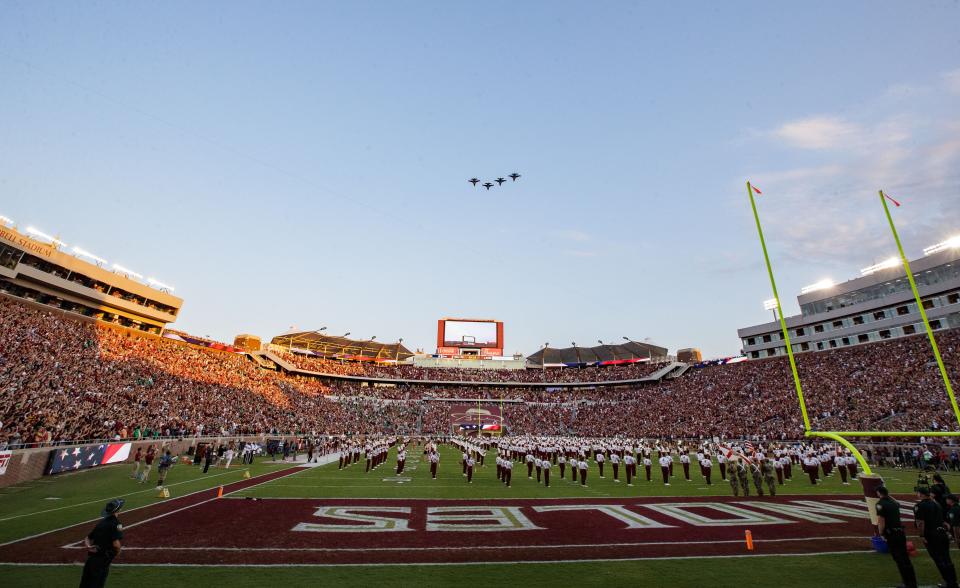Critics mobilize as Blueprint takes up bonding for Doak Campbell Stadium repairs
The Blueprint Intergovernmental Agency will vote on the next step in bonding out $20 million for repairs to Florida State University’s football stadium and other projects next week days after a "Say No 2 Doak" town hall energized critics.
The move to approve the proposal this fall has drawn concerns over the project cleaning out the budget for the next two decades of the Office of Economic Vitality, which is intended to spur and support economic development. Critics also say the institution is well-equipped to do its own fundraising.
OEV’s budget accounts for 12% of penny sales tax dollars collected over the last 20 years.
The town hall Monday was moderated by Tallahassee Branch of the NAACP President Mutaqee Akbar and drew a crowd of about 60, most of whom have already been vocal about their displeasure with the joint city-county board approving the allocation in September.
Back story:
Inside the emails: Could Blueprint dollars fund Doak football stadium renovations at FSU?
Blueprint agency commits $20 million to fund FSU stadium repairs in Tallahassee
The future of Doak? FSU shares potential renovation plans for football stadium
Akbar said he was asked to host the forum during a virtual call of about 35 people, which included several candidates for offices against commissioners who voted in favor of the proposal.
The 8-4 vote in September did not gain the support of county commissioners Brian Welch and Kristin Dozier or city commissioners Jeremy Matlow and Jack Porter.
Dozier, Porter and county commissioners Bill Proctor and Carolyn Cummings attended the town hall but did not speak due to Sunshine Law restrictions.
The push behind the forum was for IA board members at their Dec. 9 meeting to vote against paying out the $6.45 million in interest to release the bond or to postpone doing so either until after a strategic plan for OEV is developed early next year or indefinitely.
The board could also reconsider the amount or whether to fund the FSU stadium project at all.

The Doak Campbell Stadium vote is part of a bonding structure for 2022 that includes eight other projects totaling $119 million. So any vote to tinker with the funding would likely require a separate vote to remove the item for reconsideration. A final vote to approve the debt services will come at the IA board's February meeting.
The overwhelming focus of those gathered at the town hall was putting the funding destined for FSU into other economic development projects that could benefit traditionally marginalized businesses with much less political sway.
“I can think of hundreds of needs in this community that could use $20 million instead of the most well-heeled business in this town,” said former Tallahassee Mayor Dot Inman-Johnson. “Put that money where the greatest need is in this community instead of handing FSU a bag of money.”
The project, first detailed by the Tallahassee Democrat in May before it was made public, has received staunch criticism from those who say that funding renovations to an athletic stadium shouldn’t fall on the shoulders of taxpayers.
The university also has committed to raising $100 million for other stadium renovations to “enhanced fan and game day experience” at the stadium in other separate plans. It has said none of the tax money will go toward luxury upgrades.
An economic impact study identified 48 different repairs needed to create a safe usage of the stadium. They include lighting and trip mitigation, American Disabilities Act accessibility issues, code compliance issues such as adding additional water coolers and removal of wooden structures and maintenance to electrical systems, water pipes and elevators.
The same staff analysis that found the move would gut OEV’s budget also found that investing in Doak Campbell Stadium would likely mean more than $102 million in overall economic impact stemming from home football games and other in-stadium events such as concerts. That includes more than 250 jobs and $50 million in direct spending annually connected to the stadium.
More: Blueprint: Funding Doak stadium repairs could leave OEV budget dry, but also boost the economy
But there is concern that the jobs are temporary and only connected to construction jobs that could take money out of Tallahassee.
“There will be temporary jobs and there’s no guarantee that money is going to stay in Tallahassee,” said Randie Denker. “This is our money. We need to have a say over it staying in our community.”
Robin Colson said she would have liked to have seen an analysis of other economic development projects that would more broadly affect the community as a whole that the funding could go toward before the FSU proposal was considered.
“It’s about cost benefit,” she said. “It’s about $20 million. What are we getting for it? Based on this, we’re not getting anything.”
County Commission Chairman Bill Proctor said the town hall showed him there may be room to continue discussions about the funding and other possible uses as long as it aligns with the limitations that it be used for infrastructure or economic development. Proctor voted in favor of funding the FSU project.
“I’m not sure there's a clear grasp that infrastructure dollars and human service dollars are not one in the same,” he said Tuesday. “It added depth perception to the dynamics that are creating the friction in this issue. It moved the needle of my considerations, and it opens a wider corridor of thought for me.”
Contact Karl Etters at ketters@tallahassee.com or @KarlEtters on Twitter.
Never miss a story: Subscribe to the Tallahassee Democrat using the link at the top of the page.
This article originally appeared on Tallahassee Democrat: FSU stadium repair vote reignites critics of Blueprint deal

